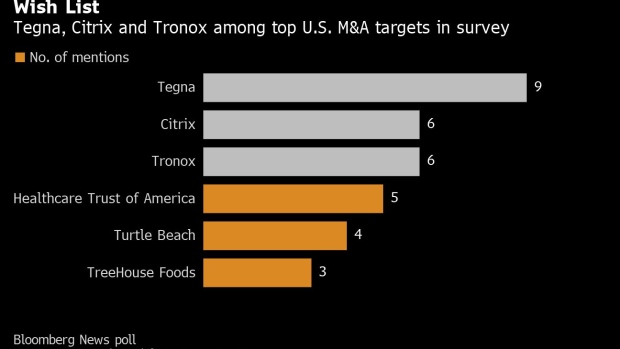Jan 26, 2022
Deal Market’s Worries About a Tougher Regulatory Environment Grow
, Bloomberg News

(Bloomberg) -- U.S. mergers-and-acquisitions activity is extending its boom into 2022, paced by Microsoft Corp.’s blockbuster takeover plan for Activision Blizzard Inc. But the clouds are darkening in the deals market amid growing doubts over whether the blur of transactions will close.
Antitrust is the main concern for merger-arbitrage funds, according to a Bloomberg News survey this month of 12 U.S.-based fund managers, analysts, and brokers. Tuesday brought confirmation that the Biden administration’s push for tougher merger reviews complicates their bets, as the Federal Trade Commission sued to block Lockheed Martin Corp.’s bid to buy Aerojet Rocketdyne Holdings Inc.
Those surveyed expect deals activity across a range of sectors this quarter, with names like Tegna Inc. and Citrix Systems Inc. gaining the most attention. But after a year that saw $2.4 trillion announced in the U.S., the most since 2015, all eyes are squarely on the shifting regulatory landscape. The key is how it could hinder investors’ ability to trade shares involved in potential transactions and make it harder to predict the odds of a deal completing on time or at all.
“Behavioral remedies, as opposed to straight divestitures, seem no longer acceptable to solve antitrust issues,” as seen in the Aerojet-Lockheed deal, said Frederic Boucher, a risk-arbitrage analyst at Susquehanna International Group.
These antitrust concerns are evident in the Activision-Microsoft spread. Activision shares were about 17% below Microsoft’s $95-per-share takeover offer as of Tuesday’s close. That gap, roughly triple the slide in the S&P 500 index since the Jan. 18 deal announcement, is a sign investors see a risk the transaction falls apart in the face of regulatory reviews. That’s even though it’s all cash, with no apparent financing hurdles.
Read more: Tegna, Citrix and Tronox Picked as Top U.S. M&A Targets: Survey
The $69 billion combination, bringing together two major gaming platforms, is expected to draw scrutiny from U.S. antitrust regulators and their counterparts in Europe and China. Analysts expect the deal will likely clear regulators, and the companies anticipate completion in fiscal 2023, pending shareholder and antitrust approvals.
For M&A investors, the Biden administration and FTC Chair Lina Khan “are seen as taking an almost activist stance towards corporate deals, especially large tech deals,” Boucher said.
Against that backdrop, two other situations involving big tech -- Take-Two Interactive Software Inc.’s acquisition of Zynga Inc., and Oracle Corp.’s purchase of Cerner Corp. -- are also trading with relatively wide spreads, according to Boucher.
Deal Momentum
M&A momentum in the U.S. remains strong, with more than $120 billion worth of deals already announced this month, data compiled by Bloomberg show. That means merger-arb investors will likely have a broad universe of stocks to trade on.
Meanwhile, calls by activist investors for boardroom changes and strategic reviews, targeting companies from Kohl’s Corp. to Peloton Interactive Inc., are driving a list of potential takeover candidates followed by the survey respondents.
“As long as strategic buyers and targets can agree on antitrust provisions in merger contracts, with continued demand from private-equity, we can see another strong M&A cycle across deal sizes,” said Aaron Glick, a merger-arb specialist at Cowen & Co.
Unsolved Cases
But regulatory concerns are paramount. A number of survey respondents said they aren’t eager to dive into trades around new deals without more visibility around long-pending transactions. Advanced Micro Devices Inc.’s takeover of Xilinx Inc. stands out, as the semiconductor merger announced in 2020 awaits Chinese approval.
For deals already under investigation or challenged by the DOJ and FTC, the merger-arb community is monitoring the final outcome to get a better sense of how to navigate the regulatory landscape. This list includes UnitedHealth Group Inc.’s proposed acquisition of Change Healthcare Inc., according to the survey.
The FTC and the DOJ “have signaled their willingness to bring difficult merger challenges in order to establish new case precedents based on the ‘market realities,’ rather than the formalistic, in their view, approach that was used by the agencies and courts for decades,” said Anna Pavlik, global counsel at United First Partners.
©2022 Bloomberg L.P.